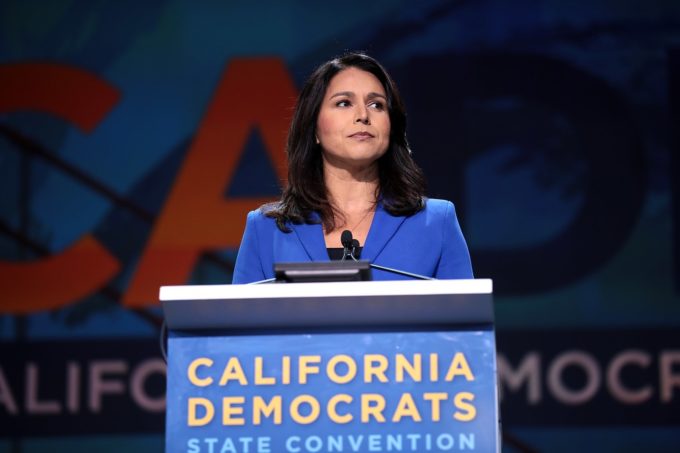
Tulsi Now, Inc. v. Google, LLC: Online First Amendment Rights and the State-Action Doctrine
By Avisha Sabaghian - Edited by Aaron Fogelson
Tulsi Now, Inc. v. Google, LLC, No. 2:19-cv-06444 (C.D. Cal. Mar. 3, 2020), order hosted by CourtListener.
On March 3, 2020, a California federal judge dismissed a lawsuit against Google brought by presidential candidate Tulsi Gabbard’s election campaign. The lawsuit alleged that Google violated the Campaign’s First Amendment rights when it temporarily suspended the Campaign’s Google Ads account shortly after the first Democratic primary debate. The court determined that Plaintiff failed to state a claim legally sufficient to implicate the First Amendment.
According to long-standing precedent, the Free Speech Clause of the First Amendment only protects against governmental abridgments of speech, not private abridgments. However, a private actor may be subject to First Amendment violations under the state-action doctrine, which establishes that a private actor may be considered a public one when it exercises a function traditionally exclusively reserved to the State.
In its complaint, the Campaign argued that the state-action doctrine renders Google a state actor. It reasoned that Google’s services constitute a public forum or its functional equivalent, and that Google’s regulation of these services amounts to regulation of free speech within a public forum. In addition, the Campaign argued that by regulating voters’ access to candidate information, Google is controlling speech within elections, which the Campaign argues is a state function. Following precedent, the court rejected this argument, reasoning that “[t]o the extent Google “regulates” anything, it regulates its own private speech and platform.”
The Supreme Court first articulated the state-action doctrine in 1883 in the Civil Rights Cases, restricting constitutional protections to either governmental conduct or private conduct serving a traditional, exclusive public function. Civil Rights Cases, 109 U.S. 3 (1883). Marsh v. Alabama was the first case to address First Amendment protections as applied to private spaces. 66 S. Ct. 26 (1945). The court in Marsh held that a company town could not restrict speech because the company town was functionally equivalent to a public municipality. However, the exception remains narrow and limited as the Supreme Court in 2000 reaffirmed the Civil Rights Cases conception of the doctrine in United States v. Morrison, 529 U.S. 598 (2000).
The state-action doctrine is rooted in the tension between personal autonomy and property rights on one hand and freedom of speech on the other, with U.S. legal precedent leaning heavily toward the former. In the past, this tension has been subject of relatively little controversy. A Harvard Law Review note attributes this to the fact that “spaces traditionally understood to be public have historically been publicly owned.” This reality is changing as much of political discourse today takes place on virtual forums that while open to public access, are nonetheless privately owned.
Recently, a growing number of lawsuits allege constitutional violations by tech giants like Google, but courts continue to reject such claims. Recently, a US appeals court ruled in a lawsuit by PragerU that YouTube, as a private forum, is not subject to First Amendment requirements even though it serves a “role as a public-facing platform.”
Scholars like Professor Jonathan Peters argue that First Amendment rights should be extended to digital platforms like Google and Facebook. Peters supports a functional balancing test as opposed to a blanket rule against First Amendment protections. Others have described the current doctrine as a "conceptual disaster," and some argue for its abandonment in favor of “a balancing approach that focuses on constitutional values.” On the other hand, Professor Eric Goldman argues that these platforms are themselves subject to First Amendment rights, and regulation of speech on these platforms amounts to abridgments of companies’ freedom of speech.
Although federal jurisprudence remains loyal to the narrower conceptions of the state-action doctrine, states are free to develop their own jurisprudence in this respect. In Lloyd Corp. v. Tanner, the Supreme Court held that states have the authority to adopt “individual liberties more expansive than those conferred by the Federal Constitution,” and that states “may adopt reasonable restrictions on private property so long as [they] do not amount to a taking without just compensation.” 424 U.S. 507 (1976). For example, in Golden Gateway Center v. Golden Gateway Tenants Association, the California Supreme Court espoused a case-by-case approach to the state-action doctrine, focusing on a property’s public use rather than its private ownership. 29 P.3d 797 (Cal. 2001). It remains to be seen whether more states will adopt similar approaches to the doctrine in the future.
Avisha Sabaghian is a 1L at the Harvard Law School.